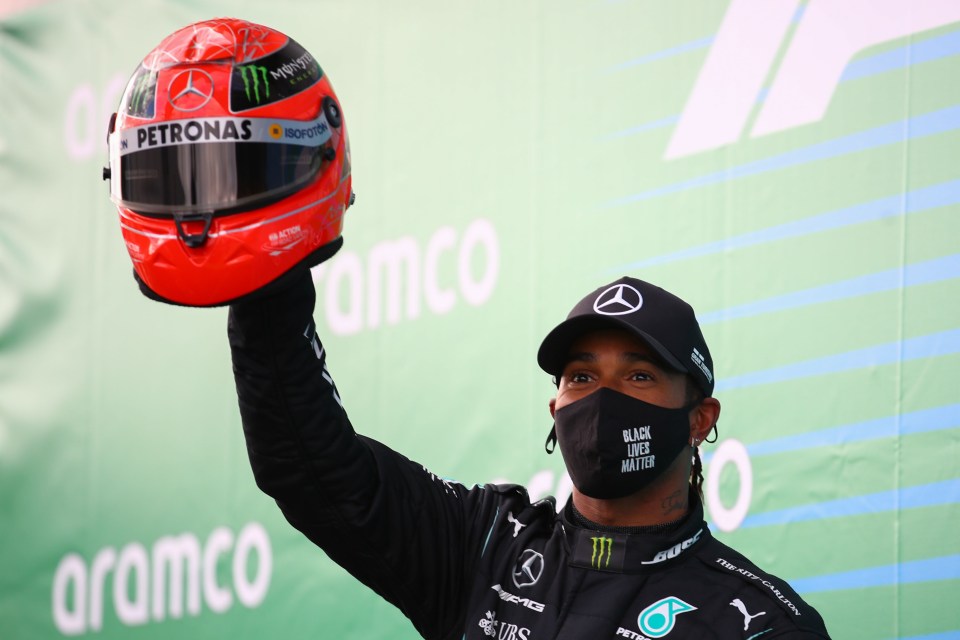Formula 1 is arguably the hardest sport to work out who the GOAT is but that won’t stop fans from continuing the debate.
The evolution of motorsport since F1’s debut season in 1950 has meant pitting drivers against each other is a stream of hypotheticals.
Hamilton was gifted one of Schumacher’s helmets after matching his win recordAFP
73 years later the cars are faster, the tracks are different, the point system has changed and the amount of Grand Prix has increased.
Drivers have more reliable engines and are fed endless amounts of data, which all makes looking at stats alone come with a caveat.
For example, six-time race winner Sergio Perez has a higher overall points total in F1 than seven-time champion Michael Schumacher.
So, how do you rank the best of all time? Well, not to spoil the conclusion, but the short answer is you can’t ever definitively.
However, a combination of stats, career length and overall legacy means a pound-for-pound list is worth arguing…
Honourable mentions include two iconic British drivers, from Nigel Mansell, who topped Grand Prix wins until Lewis Hamilton’s rise, to Jim Clark, who boasted a remarkable 34.25 per cent win rate in all the races he competed in – at a time when reliability was poor.
Another special nod is for three-time world champion Niki Lauda, who boasted one of the greatest comeback stories in F1 history.
Most F1 World Drivers’ Championships won
* – Still active
Seven
*Lewis Hamilton – 2008, 2014, 2015, 2017, 2018, 2019, 2020
Michael Schumacher – 1994, 1995, 2000, 2001, 2002, 2003, 2004
Five
Juan Manuel Fangio – 1951, 1954, 1955, 1956, 1957
Four
Alain Prost – 1985, 1986, 1989, 1993
Sebastian Vettel – 2010, 2011, 2012, 2013
Three
*Max Verstappen – 2021, 2022, 2023
Jack Brabham – 1959, 1960, 1966
Jackie Stewart – 1969, 1971, 1973
Niki Lauda – 1975, 1977, 1984
Nelson Piquet – 1981, 1983, 1987
Ayrton Senna – 1988, 1990, 1991
10. Gilles Villeneuve
First race: 1977 British Grand Prix
World Championships: 0
Number of races: 67
Number of wins: 6
Number of pole positions: 2
Career points: 107
For many British fans, Sir Sterling Moss is regarded as the greatest to never to win a world championship.
However, for others, it’s this man – and for the uninitiated, no it’s not a typo that number 10 on this list goes to a driver that has won the same amount of races as Red Bull’s Perez.
In F1, stats alone don’t always paint the full picture which is why Moss, Clark, and Villeneuve’s talents need a more complex analysis.
The latter was one of the few to earn both the respect and the love, of the notoriously narcissistic and misanthropic Enzo Ferrari.
Not because Villeneuve was ever submissive to the iconic Italian, but because of his unwavering attitude in the face of any situation – with the speed to back it up.
Gilles Villeneuve with his son Jacques (right) who won the 1997 world championshipGetty
Enzo Ferrari usually evoked his deepest tributes for his car not the driver behind it
The original ‘Rainmaster’ had one of his finest hours in a sodden practice session for the 1979 US Grand Prix when he finished over 9.5 seconds quicker than his Ferrari team-mate Jody Scheckter, who was the current world champion.
That should have been the year the French-Canadian won the title himself, but he duly played the team game at Monza and finished behind his South African pal, which in turn, meant Scheckter beat him by just four points.
Speaking at his funeral, Scheckter said: “I will miss Gilles for two reasons. First, he was the fastest driver in the history of motor racing. Second, he was the most genuine man I have ever known.”
Symbolically, his son Jacques completed his legacy by become the first Canadian to win the title in 1997 – 15 years after the accident in qualifying for the 1982 Belgian Grand Prix that claimed his father’s life.
It’s fitting that for drivers, the site of the thrilling Canadian Grand Prix has been immortalised as the Circuit Gilles Villeneuve.
For fans, the image of the man, whose tenacity was such that he drove a whole lap on three wheels at Zandvoort, will never be forgotten.
Hamilton’s maiden race win in F1 came at the Gilles VilleneuveGetty
9. Sebastian Vettel
First race: 2007 United States Grand Prix
World Championships: 4 (2010-13)
Number of races: 300
Number of wins: 53
Number of pole positions: 57
Career points: 3098
The German’s legacy perhaps doesn’t get the respect it deserves considering the manner in which his F1 career finished in 2022.
The 37-year-old decided to call it a day in relative mediocrity with Aston Martin after 15 years in the sport.
However, he remains pivotal in Red Bull’s rise to constructor kings, having reigned as a four-time world champion.
In 2008, he became the youngest driver in history to win a race at just 21 before his record was broken by Verstappen eight years later.
At his peak, Vettel beat Schumacher for the most consecutive wins with nine and levelled his compatriot for most wins in a season on 13 – before Verstappen overhauled both feats as well.
Vettel had the honour of racing his childhood hero Schumacher before he retiredGetty
He then came close to emulating his idol Schumacher in ending a Ferrari drought for a title – only to be denied by Hamilton’s magic.
Off-track, Vettel does share a lot of qualities with the Mercedes man, having also been described as an amazing role model.
He helped the all-female W Series grow into a leader in motorsport, took a stand against Russia’s invasion of Ukraine, and has spearheaded several initiatives to use sustainable fuels in F1.
Vettel and Hamilton both used their platforms to champion change in F1Getty
8. Fernando Alonso
First race: 2001 Australian Grand Prix
World Championships: 2 (2005-06)
Number of races: 398
Number of wins: 32
Number of pole positions: 22
Career points: 2329
The Spaniard has perhaps the greatest disparity between how he’s rated among his peers and his actual success in F1.
That’s not to downplay his achievements though – Alonso is a double world champion and has the seventh-highest number of race wins ever.
Those title triumphs at Renault came by knocking the great Schumacher off his perch following Ferrari’s five straight titles.
However, his 2007 switch to McLaren was the start of building his reputation for bad career choices that have dogged him for years.
So much has already been written about that season, from losing to a rookie teammate to ‘Spygate’ and his war with team bosses.
Alonso broke into the sport and took down the great Michael SchumacherGetty
His fans will argue that he got identical points, wins, and podiums with Hamilton across the 17 Grand Prix seasons which often gets overlooked – but it undeniably set the stage for lingering tension between the two that remains to this day.
Alonso then found himself in a second F1 scandal the following season, as he continued to join teams on downward trajectories having rejected the upstart Red Bull in favour of a Renault return.
The 43-year-old is a firm fan favourite for his fearless, aggressive driving style and he has been credited with extracting more from sub-par machinery than his rivals.
Alonso could and maybe should have shared more podiums with HamiltonGetty
7. Sir Jackie Stewart
First race: 1965 South African Grand Prix
World Championships: 3 (1969, 1971, 1973)
Number of races: 99
Number of wins: 27
Number of pole positions: 17
Career points: 360
It’s a mark of the legacy the Scotsman left upon F1 that winning three world titles with two different teams isn’t his crowning glory.
The ‘Flying Scot’ is a highlight on television and talkSPORT for modern fans, but for an older generation, he remains far greater.
Stewart filled the void left by compatriot Clark, the benchmark driver of his era, who died in an F2 accident at Hockenheim in 1968.
A year later, Stewart had claimed his maiden F1 crown after six victories in the opening eight races.
He also became the first driver to lead at least one lap in every race of the season and his 27 Grand Prix wins was a record that stood for 15 years after his retirement.
Stewart is the oldest living Grand Prix winnerGetty Images
Stewart retired one race short of 100 Grand Prix starts following the fatal crash of his Tyrrell teammate Francois Cevert during a practice session for the 1973 United States GP.
While he was unable to save the life of his protege, his tireless work in advocating for increased protection in motorsport undoubtedly rescued so many others.
He led a driver boycott of the 1969 Belgian Grand Prix over its lack of safety following his accident on the old Spa-Francorchamps layout three years prior.
Stewart pioneered the introduction of barriers and travelling medical units to be at tracks in addition to seatbelts and full-face helmets.
His continued push for driver welfare laid the foundations for the birth of the halo cockpit system that has saved the lives of Hamilton, Charles Leclerc, and Zhou Guanyu.
Both Hamilton and Stewart have been knighted
6. Alain Prost
First race: 1980 Argentinian Grand Prix
World Championships: 4 (1985-86, 1989, 1993)
Number of races: 199
Number of wins: 51
Number of pole positions: 33
Career points: 768.5
The Frenchman tellingly claimed in a 2024 interview with MotorSport Magazine: “It sounds like a joke but I’m completely underrated!”
It might seem a ridiculous notion on the surface as Prost is one of only five men to have won at least four F1 world titles.
However, he believes his achievements and overall career should be handed with more nuance than just his rivalry with Senna.
The pair’s heated battles in the 1980s and 1990s provided some of the sport’s most iconic moments.
Their crash at the Japanese Grand Prix in 1989 handed Prost the title that season, while a year later Senna appeared to deliberately hit his rival in the final race of the season, thus handing himself the championship.
The two were often seen as the perfect foils, with Prost’s strategic and calculated approach installing himself as the ‘villain’ of the era to neutral fans in contrast to Senna’s bold, flamboyant style.
Prost and Senna’s rivalry was one for the ages
The solidification of Senna’s iconic status following his premature passing may have led to the downplaying of Prost’s overall brilliance.
He beat both his nemesis and Lauda in equal machinery, while also racing against Brit legends Mansell and Hill in his time at the top.
Prost earned the nickname ‘The Professor’ during his 12 years at the pinnacle of motorsport and remains France’s only world champion.
He won F1 races for four different teams – Renault, McLaren, Ferrari and Williams – and it was at the latter where he claimed his fourth title at 38 years old in 1993 following a year-long sabbatical.
Prost is the only one of 74 French F1 drivers to win the title…he’s done it four timesGetty
5. Max Verstappen
First race: 2015 Australian Grand Prix
World championships: 3 (2021, 2022, 2023)
Number of races: 203
Number of wins: 61
Number of pole positions: 40
Career points: 2917.5
At just 26, it’s almost frightening how high the Dutchman already is on this list with plenty of time still on his side – should he want to.
The major stumbling block from Verstappen having a strong case for challenging for first is his admission that he won’t have a long career.
His preference to stay out of the limelight and remain low-key off-track may stop him from ever transcending the sport in the way Schumacher or Hamilton have done.
However, should those two factors change as he continues to mature then no bar will seem out of reach for the Red Bull superstar.
He’s already the youngest driver and winner in F1 history – stats which can likely never be broken under the new regulations.
Verstappen became the youngest winner in history at the 2016 Spanish GPGetty
Verstappen’s proven what he can do in a dominant car and if there were any doubts surrounding the legitimacy of his first title, look at what he’s managed in the years since.
He claimed a record-breaking 19 wins in 2023 to end the year 290 points clear of teammate Perez and a further 51 clear of his nearest non-Red Bull challenger, Hamilton in third.
Such was his unrivalled success that fans have had to wait for a timely reminder of his racecraft when he’s not winning by huge margins.
Look no further than the current season, where McLaren has had the leading vehicle since the Miami Grand Prix in round six.
Heading into that race Verstappen had a 52-point lead over Lando Norris – 13 races later post-Singapore the gap remains the same.
Verstappen is looking for a fourth title in a row
Most points scored since Miami GP 2024
Max Verstappen (Red Bull) – 221
Lando Norris (McLaren) – 221
Oscar Piastri (McLaren) – 199
Sergio Perez (Red Bull) – 39
4. Aryton Senna
First race: 1984 Brazilian Grand Prix
World Championships: 3 (1988, 1990-91)
Number of races: 161
Number of wins: 41
Number of pole positions: 65
Career points: 610
Prost will disagree, but his rival’s talents on track and his persona off it, is the reason he’s above on this list.
That’s a remarkable feat for a man who spent just ten years in Formula One but one that became a hero for decades beyond.
While Prost wishes to be celebrated for more than their rivalry, Senna emerged as the victor of the most lauded season from their conflict.
The duo won fifteen of the sixteen races between them in 1988, but it was the Brazilian, in his first year with McLaren, who triumphed.
His charisma, outspokenness and ruthless streak ultimately drove Prost out of the team, before scooping a double across 1990-91.
However, there was another side to Senna – who risked his own safety to save the life of Erik Comas during qualifying for the 1992 Belgian Grand Prix when he abandoned his car to run onto the track and treat the Frenchman following a heavy crash.
Senna’s desire to push boundaries of what was possible within F1 was perfectly encapsulated by his reputation as a wet-weather master.
Hamilton has always been vocal about his idol, the late SennaAFP
His iconic ‘Lap of the Gods’ in the rain-hit 1993 European Grand Prix at Donington Park remains one of the best single laps in history.
Senna’s death at the 1994 San Marino Grand Prix when he was just 34 took a superstar in his prime.
It has also caused endless ‘what if’ questions around the landscape of the late 90s, including a true battle with heir apparent, Schumacher.
When considering his lasting legacy, his death resulted in the most dramatic overhaul of safety regulations the sport has ever seen.
At the time of his passing, he had achieved more pole positions than anyone else with a then-record 65 – which is an incredible 40 per cent of the races he started.
Senna’s fatal crash is widely considered one of F1’s most tragic incidents
3. Juan Manuel Fangio
First race: 1950 British Grand Prix
World Championships: 5 (1951, 1954-1957)
Number of races: 51
Number of wins: 24
Number of pole positions: 29
Career points: 277.643
The original poster boy of F1 and probably the most contentious spot on the ranking depending on the generation.
For older motorsport fans, Fangio remains the undisputed GOAT whose feats behind the wheel can’t be compared to the modern era.
The Argentinian only started racing in his 30s, but when Grand Prix racing became organised in 1950, he was primed to dominate.
Fangio was often the oldest driver on track and the eventual five-world champion didn’t win his first until age 40.
Thus began an annihilation of the young upstarts racing against him, at a time when the sport was its most dangerous.
Fifteen F1 drivers died in Fangio’s decade of dominance in the 1950s and yet he was a master of hopping between different and less-reliable machinery while maintaining his success.
He remains the only one to win the championship with four different teams – Alfa Romeo, Maserati, Mercedes-Benz, and Ferrari.
Fangio is the only Argentine to win a world title in F1
Fangio’s 24 wins in comparison may seem low by modern standards, but F1 at the time had eight Grands Prix in a season not 24.
A better reflection of his ability is his record for having the highest winning percentage of any driver in the sport’s history.
Beyond his career achievements, several of his individual drives have left such a mark that Brit legend Stewart still hails to this day.
Fangio’s finest hour came in his last F1 win when he suffered a disastrous pit stop from the lead of the 1957 German Grand Prix.
A hapless search for a stray wheel nut left Fangio on lap 14 of the 22-lap race down in third place, 50 seconds behind the two leading Ferraris of Mike Hawthorn and Peter Collins.
‘The Godfather of Formula One’ proceeded to break the 20km circuit lap record 9 times (7 of them being in successive laps) to overhaul them both on the penultimate lap to win the race and his fifth title.
Fangio was voted the greatest F1 driver in history, during the Silverstone 50th anniversary Gala in 1998Getty
2. Michael Schumacher
First race: 1991 Belgian Grand Prix
World Championships: 7 (1994-95, 2000-04)
Number of races: 308
Number of wins: 91
Number of pole positions: 68
Career points: 1566
The prototype of the modern F1 driver, a joint-record seven-time world champion and a hero to most of the current grid.
The German, who won the first of his two titles at Benetton, is of course known for his era of domination in the 2000s.
Schumacher’s legacy with F1’s most famous and successful team is so great that he’s as synonymous with the Prancing Horse as their founder, Enzo.
He helped Ferrari win its first world title since 1979, before scooping an unprecedented five consecutive titles from 2000 to 2004.
He fused elements of all the greats before him into one with Prost’s calculating approach and Senna’s speed.
Those characteristics, combined with being a pioneer of fitness training and sport science in F1 and a ruthless approach to winning while driving the best car, created an unstoppable force.
Schumacher changed the game in F1 before Hamilton’s arrivalGetty
Now, it would be easy to deduce who has claimed the top spot with Schumacher as second so let’s skip straight to why.
Although he remains tied on titles with Hamilton, a number of his most dominant records, including most wins (91), pole positions (68), and podium finishes (155), have all been broken by the Brit.
Schumacher still has the edge elsewhere, such as his number of total fastest laps (77), which is a fair argument when comparing the pair’s raw pace.
However, while both had dominant cars at their peaks, Schumacher’s list of opposition is inferior to Hamilton’s.
His greatest rival Senna died in the 1994 season having looked highly likely to claim that season’s title – with the former only winning by a single point over the Brazilian’s Williams teammate, Damon Hill.
Senna’s passing meant the landscape of F1 in the 90s remains the biggest what-if
Even Schumacher accepts the mitigating factor behind his first world title, having later dedicated that triumph to Senna.
Senna’s passing left Schumacher to compete against Hill, Mika Hakkinen, and Alonso. Hamilton has battled the Spaniard too as well as Vettel, Kimi Raikkonen, Nico Rosberg and Verstappen.
After stepping away from the sport in 2006, Schumacher’s unsuccessful comeback with Mercedes four years later sparked similar parallels to Hamilton over longevity and capacity to challenge in a Silver Arrows car that isn’t the best on the grid.
His win-at-all-costs mentality also remains polarising to this day, with one of his infamously aggressive incidents seeing him retrospectively disqualified from the ‘97 championship for intentionally attempting to crash out Jacques Villeneuve in the final race.
He also deliberately crashed in qualifying for the 2006 Monaco Grand Prix to prevent drivers behind him from beating his time – at 37 and while already a seven-time world champion.
In addition, Schumacher was only ever teammates with a world champion once (six races alongside Nelson Piquet at Benetton, 1991), while Hamilton has gone head-to-head with Alonso while being a rookie, before later Jenson Button and Rosberg.
Hamilton will be hoping to surpass Schumacher’s record of seven world titlesGetty
1. Lewis Hamilton
First race: 2007 Australian Grand Prix
World Championships: 7 (2008, 2014-15, 2017-20)
Number of races: 350
Number of wins: 105
Number of pole positions: 104
Career points: 4813.5
A London-based outlet championing a man born over 30 miles from talkSPORT.com’s headquarters might spark accusations of bias.
However, every metric has the Stevenage driver as, not only F1’s GOAT, but as one of Britain’s greatest-ever sportsman.
As Vettel told talkSPORT in April, Hamilton has the statistics.
The now-39-year-old either shares or owns outright over 75 individual F1 records in his 18 seasons on the grid.
The most coveted accomplishment among them is his status as a joint-record seven-time world champion.
Hamilton in 2022: ‘I know what I am – I know how good I am but I don’t really like to talk about it’ – so we will
It would have been an outright leading eighth had the FIA not manipulated the final lap of the 2021 season in a decision they later admitted to finding ‘human error’ against.
Undoubtedly his success was helped by Mercedes’ mastery of the turbo-hybrid era, but the same can be argued for Schumacher at Ferrari and more recently, Verstappen with Red Bull.
Looking beyond that shows Hamilton has always proved the difference maker in extracting the best from his vehicle.
He finished runner-up in his rookie year with McLaren after beating teammate Alonso, who was then the reigning back-to-back world champion, before claiming his maiden title in 2008.
Six races into his F1 career at age 22 he won the 2007 Canadian Grand PrixAFP
Over 100 race wins later he won the British Grand Prix for a record ninth timeGETTY
His record of 104 poles underlines his consistent raw pace, with wins in 30 different countries and at 31 different circuits proving his versatility and longevity.
Hamilton won a race in every season from 2007-2021, and despite being in the twilight of his storied career, still delivered career-best drives such as Silverstone 2024 which ended a 945-day wait for a victory in the under-performing W15.
Away from the track, Mercedes’ No.44 leaves a legacy beyond the record books he has filled up, with a global following to boot.
Hamilton is the first and – to date only – black F1 driver and has faced racist abuse and financial struggles in his bid to reach the top.
He has raced with a rainbow flag in countries where homosexual acts are illegalGetty
He has also used his platform to champion human and animal rights activity, which included wearing a rainbow helmet at Grands Prix held in Qatar to support the LGBTQ+ community.
Hamilton founded a charity ‘Mission 44’, to help people from a wider range of backgrounds enter motorsport and regularly condemns the lack of gender diversity in F1 as well.
A move to F1’s most famous team Ferrari next year offers F1’s GOAT the chance at a perfect send-off to an unrivalled tenure…



